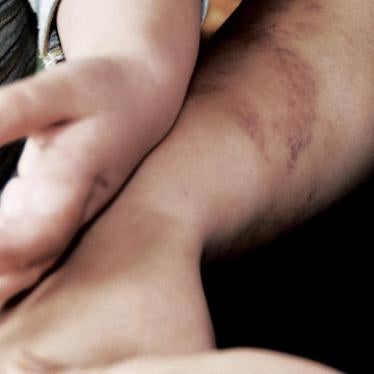I met Veronika, a 33-year-old woman from a small village in Hungary at a shelter for domestic violence survivors on a rainy day in March. She was initially terrified of talking to me, fearing that her partner would be able to identify and find her. She had visible knife wounds and cuts from lashes on her body, as well as scars she said were from sword cuts to her throat during years of violent abuse.
Veronika told me that her partner was on good terms with the police and the times she did call the police after a brutal assault, officers told her that “unless blood flows,” they wouldn’t intervene. She eventually stopped calling. “You tell me, wouldn’t you lose trust in these people?” she asked me.
While researching domestic violence in Hungary, I heard that chilling phrase—“unless blood flows”—countless times from women, shelter workers and even members of the police force. That alone suggests that the current system for responding to domestic violence and protecting victims simply isn’t working.
Earlier this year, Hungary adopted a new criminal code making domestic violence a stand-alone criminal offense. Though positive, the legal provision contains several pitfalls. It narrowly defines the circle of victims, excluding women who don’t live with their partners unless they have children with the abuser, and requires repeated instances of abuse for the abuser to be prosecuted. And by itself, the reform doesn’t address the problems women face when they seek protection.
Our research suggests that police inaction, victim-blaming attitudes and downplaying the importance of abuse is commonplace in Hungary. Many women told me about the complete disregard with which police handled their reports of domestic violence. Borbála, 28, said the police ignored her visible injuries and bleeding nose and sided with her husband. They didn’t even ask her what had happened, she said: “The police officer told me to my face that it’s ok for a woman to get a few slaps.”
Since 2009, the police have had the power to issue on-the-spot temporary restraining orders, but they rarely do so. Instead, police often ask the woman in front of her abuser if she wants a restraining order. Many decline out of fear of reprisals.
In some cases, doctors and social workers, who can play a critical role in detecting abuse, don’t provide adequate advice or assistance to victims. I found cases in which doctors were reluctant to ask survivors if they wanted the abuse reported, and didn’t document the injuries adequately —crucial for any effort to prosecute the abuser.
Three women told me that child welfare services threatened to remove their children on the grounds of child endangerment. Virág, a 37-year-old mother of three, told me that child welfare services said that unless her husband behaved differently or she left, they would take her children. “After that,” she said “my husband knew he could do anything to me because I wouldn’t call the police in fear of the authorities.” Hostile attitudes, inaction and insufficient regard for domestic violence survivors discourage and demoralize victims of violence, leading many to believe they have no choice but to remain in abusive relationships.
When women do manage to escape their abusive situations, they often have a hard time finding a safe place to go. Hungary has only 122 shelter beds for domestic violence survivors. International guidelines say it should have 1,000.
Women are allowed to stay in the shelters for no more than 60 days, after which mothers with children may be eligible for accommodation in temporary shelters. For women without children, the choice is between a homeless shelter, perhaps a few nights at a friend’s house, or, in most cases we documented, back to the abuser.
The Hungarian government took an important step when it reformed its criminal code, but authorities need to do a lot more to live up to both Hungary’s international legal obligations and its basic responsibility to protect its citizens from harm.
Hungary needs a national strategy to prevent and respond to domestic violence. Police, doctors, and social workers need training and guidelines to ensure appropriate responses to domestic violence. All women, regardless of the type of relationship they are in or whether they have children need to benefit equally from the legal framework without discrimination, and to have safe places to go when they escape abuse.
Finally, the government has an obligation to guarantee genuine responses when violence does occur, including through effective use of restraining orders and by prosecuting abusers. Women not only need a means to seek protection and justice, but the confidence to turn to the government for protection.
More blood shouldn’t have to flow before women victims of domestic violence in Hungary can count on the authorities to give them the protection and assistance they need.
Lydia Gall is the Balkans and Eastern Europe researcher at Human Rights Watch. She is the author of the new Human Rights Watch report: “Unless Blood Flows – Lack of Protection from Domestic Violence in Hungary.” Follow her on Twitter: @LydsG








